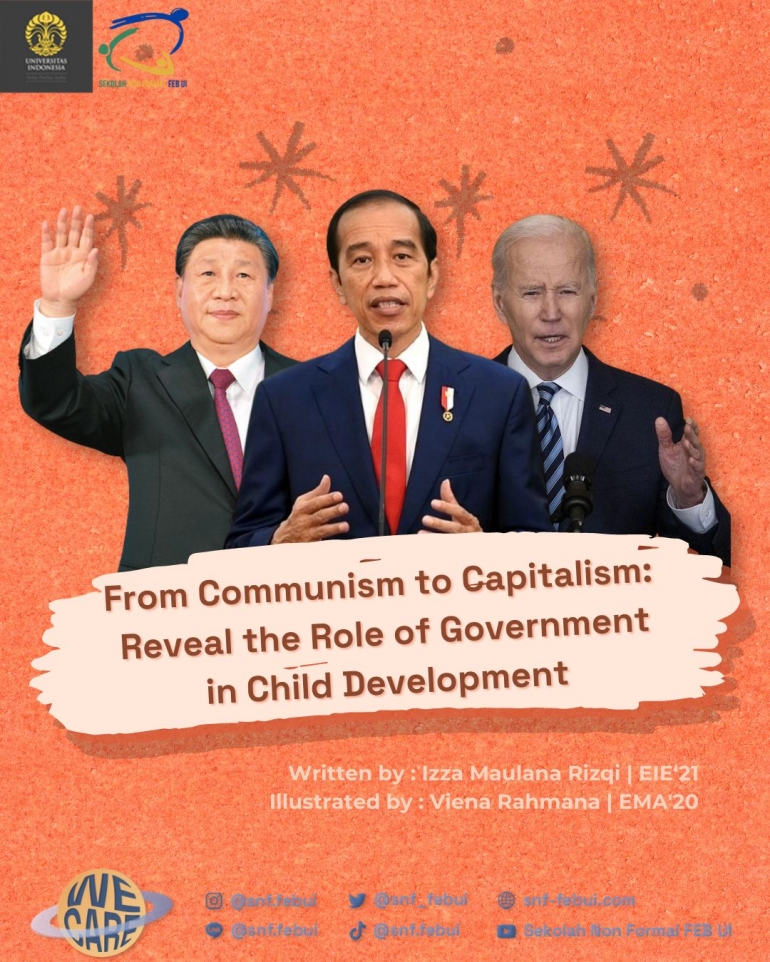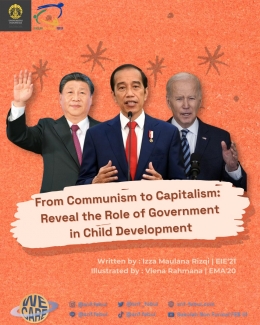First, let's talk about communism. However, to know more about the relationship between communism and child development, it is necessary to first know the meaning of communism. In short, communism is a system that seeks to build a society based on solidarity and the fulfillment of needs. That is, in communism, private property rights are not recognized and are replaced by common ownership instead [7]. Meanwhile, in education, apart from learning science, countries with a communist system also emphasize the indoctrination of communist ideology. As was the case in Poland prior to the educational reforms of 1954/1955, this indoctrination was often followed by exaggeration of communism and an exaggerated denigration of capitalism. As a result, students become unable to assess the real conditions objectively. In addition, due to the teaching pattern that emphasizes too much fearfulness and obedience, children are proven to lack critical thinking and curiosity [8].
Meanwhile, economically, countries with communist systems tend to have stagnant economic growth. This statement refers to the economic conditions that occurred in the Soviet Union in the period 1970 -- 1975 and 1975 -- 1980. In the period 1970 -- 1975, the GNP growth of the Soviet Union was only 3.7%, while it was 2.6% in the period 1975 -- 1980 [9]. The economic stagnation caused a decline in the quality of life in the Soviet Union which was already lower than in some countries. As a result, there is a shortage of food and necessities [10]. In this case, the children become one of the affected parties based on the reason that the country's unfavorable economic conditions will directly affect children as described in the previous section.
Besides its negative impact, communism is not always a negative thing. In theory, communism brings equality to all members of society. Meaning, if implemented according to theory, communism can provide comprehensive access to the whole society, including education and health in it. So, even children with poor economic conditions can still enjoy the health and education facilities that other children experience [11].
Next, it's time for us to explore the other pole, namely capitalism. In general, capitalism is an economic system in which private actors own and control property in accord with their interests, and demand and supply freely set prices in markets in a way that can serve the best interests of society [12]. Because the supply and demand mechanism is purely determined by the market, including supply and demand from workers, capitalist countries are prone to the practice of child labour. This vulnerability arises when there is a shortage of labor supply in the market. No nonsense, the statement refers to what is happening in the United States. Due to the lack of labor supply that occurred, McDonald's in Oregon opened a job opening for a 14-year-old child [13]. Child labor is a serious problem, its impact cannot be taken lightly. At least, there are some negative impacts from child labour, including lack of schooling results in missing educational qualifications and competition of children with adult workers that leads to depressing wages and salaries [14].
However, just like communism, capitalism also has its advantages. Capitalism opens wider opportunities for people to carry out economic activities in the market. This is contrary to what happened in the era before capitalism, where the family became the center of economic activity so that family productivity was the main orientation. As a result, the family prioritizes the number of children to support this productivity, resulting in the quality of development of each child neglected. With capitalism, the number of children in the family decreases so that parents can focus more on investing in the education and health of each child [15].
Open Letter to the Government: This is What You Should Do!
When talking about children, the discussion does not stop at the welfare of children, but also the welfare of the country in the future. This statement is based on the fact that children with certain qualities today are human resources for their country in the future. Given this, the quality of child development is very important for a country. Knowing that the government has a significant role in the quality of child development, we can conclude that there are many things that the government can do to ensure this quality. In this case, efforts that can be made by the government to maximize the quality of child development include creating child-oriented public policies, educating parents about good parenting, and running support programs for families.
Creating child-oriented public policies can be done by designing policies that encourage non-cognitive skills in children, such as creativity, problem solving, and critical thinking. If owned by today's children, these skills are believed to be able to increase worker productivity in the future. Meanwhile, this can be done by designing the educational curriculum to promote these skills or make sure teachers are qualified to instill these skills in children [16].
Next, educating parents about good parenting. It is no longer a secret that the parenting pattern of parents greatly determines the condition of the child. In this case, the government can educate good parenting patterns to ensure the child's condition is guaranteed. Meanwhile, this can be done in several ways, including holding a monthly magazine on parenting, conducting regular home visits, and conducting intensive training for parents regarding parenting. Some of these efforts have been carried out in the United States and have shown a positive impact on parental knowledge [17].
Lastly, running support programs for families. The implementation can refer to the supporting families program that has been implemented in the United Kingdom. Because of the supporting families programme's debut in 2011, families and communities in the UK have gained an enormous amount of support, with up to 1.533 billion in funds made available since its inception. Between 2015 and 2021, the initiative assisted more than 400,000 families in achieving positive outcomes through various means [18]. As a result, the welfare of the family will clearly encourage improvements in child development.
Oleh: Izza Maulana Rizqi
Staff Biro Jurnalistik
SNF FEB UI 2021-2022







